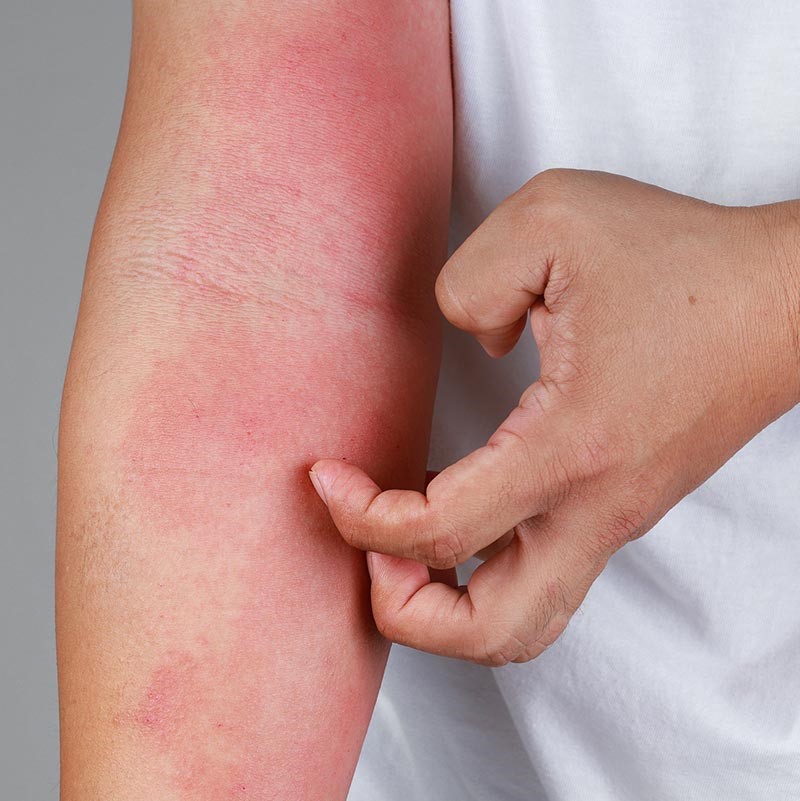Eczema
Eczema, or atopic dermatitis, is a chronic skin condition affecting millions worldwide. It is a non-contagious condition that causes the skin to become red, inflamed, and itchy.

What is Eczema?
Eczema is a non-contagious condition that causes the skin to become red, inflamed, and itchy. While the exact cause of eczema is not fully understood, it is believed to result from genetic, environmental, and immune system factors. Many people with eczema have a family history of allergies, asthma, or hay fever.
Types of Eczema
Eczema manifests in several forms, each with unique characteristics:
- Atopic Dermatitis: The most common form, often linked to other allergic conditions.
- Contact Dermatitis: Triggered by exposure to irritants or allergens.
- Dyshidrotic Eczema: Causes small, itchy blisters on the hands and feet.
- Nummular Eczema: Appears as round, coin-shaped spots on the skin.
- Seborrheic Dermatitis: Often affects oily areas like the scalp and face.
- Stasis Dermatitis: Occurs in the lower legs due to poor circulation.
Symptoms of Eczema
Eczema symptoms can vary but commonly include:
- Intense itching, particularly at night
- Red or brownish-gray patches of skin
- Dry, scaly, or cracked skin
- Thickened or swollen skin in chronic cases
- Small, raised bumps that may ooze and crust over if scratched
Common Triggers
Several factors can trigger eczema flare-ups, such as:
- Environmental Factors: Extreme heat, cold, or humidity.
- Irritants: Harsh soaps, detergents, or fragrances.
- Allergens: Dust mites, pollen, mold, or pet dander.
- Dietary Factors: Certain foods, such as eggs or dairy, may exacerbate symptoms in some individuals.
- Stress: Emotional stress can lead to flare-ups.

Diagnosis and Treatment
Diagnosing eczema begins with a physical examination and review of your medical history. In some cases, additional tests like patch testing or skin biopsies may be conducted to identify specific triggers or rule out other conditions.
At Jacksonville Dermatology & Cosmetic Surgery, we take a personalized approach to eczema treatment:
- Topical Treatments: Prescription creams or ointments to alleviate inflammation and itching.
- Oral Medications: Antihistamines or immunosuppressants for severe cases.
- Phototherapy: Controlled exposure to ultraviolet light to reduce symptoms.
- Lifestyle Modifications: Guidance on skin care routines and avoiding known triggers.
- Moisturizers: Specially formulated products to hydrate the skin and maintain its barrier function.
Preventive Care
Preventing eczema flare-ups is a crucial part of long-term management. Here are some tips:
- Moisturize Regularly: Apply fragrance-free moisturizers immediately after bathing.
- Use Gentle Cleansers: Choose mild, hypoallergenic products.
- Wear Comfortable Fabrics: Opt for soft, breathable materials like cotton.
- Manage Stress: Practice stress-reduction techniques such as meditation or yoga.
- Hydrate and Eat Well: Drink plenty of water and maintain a balanced diet.
Why Choose Jacksonville Dermatology & Cosmetic Surgery?
At Jacksonville Dermatology & Cosmetic Surgery, we combine state-of-the-art dermatological care with compassionate, personalized attention. Our board-certified dermatologists specialize in treating eczema, offering innovative solutions tailored to your needs. We are committed to helping you achieve healthier, more comfortable skin and a better quality of life.
Contact Jacksonville Dermatology & Cosmetic Surgery Today
Are you or a loved one dealing with eczema? The team at Jacksonville Dermatology & Cosmetic Surgery is here to help.
Contact us today to schedule an appointment.
Let us partner with you on your journey to healthier skin. Contact us today—we look forward to hearing from you!
GET IN TOUCH
